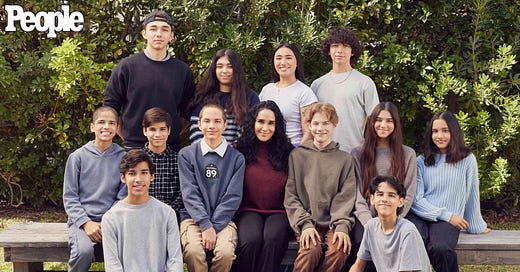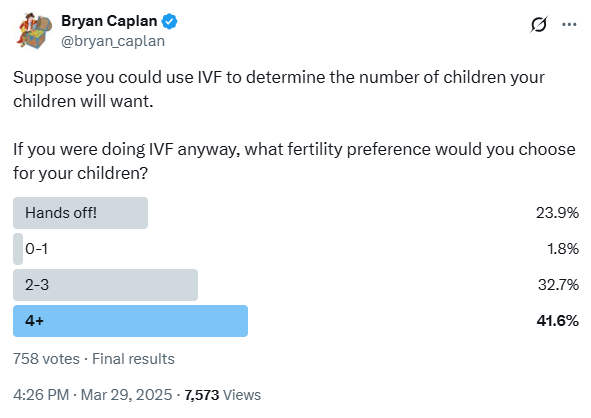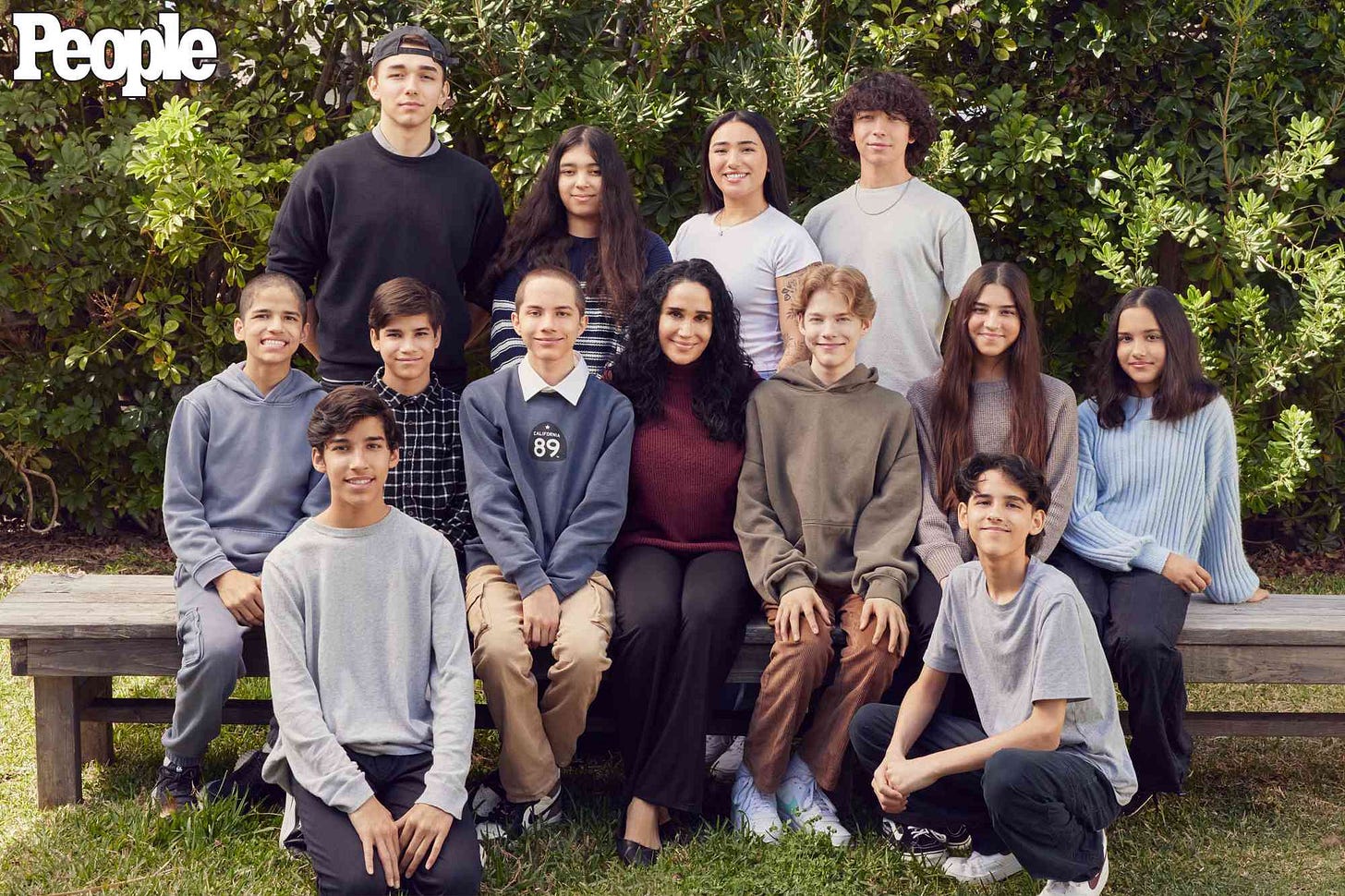
I just got back from Natal-Con in Austin. Here are my main thoughts.
Kevin Dolan and Luke, the organizers, made the whole event run like clockwork. They were instantly responsive to all of my logistical concerns. Most impressive for a new and rapidly growing event. Despite some critical comments below, I’m personally grateful to both of them.
All of the attendees that I met seemed thoughtful, friendly, and surprisingly apolitical. Most people over 30 had more than two kids. At Natal-Con, my “I only have four kids” joke wasn’t a joke. At least 20% of attendees had more kids than me. The fifth Collins baby is already on the way.
The event included about two dozen babies, plus a dozen or so younger kids. All were eerily well-behaved. It was tempting to interpret this as reverse causation: People with exceptionally good kids tend to think that people should have more kids. But that’s fairly fanciful.
I’ve never been protested before in my life, much less called a Nazi. But both happened as I entered the opening Friday dinner. Eight protestors, all but one masked, were furious about the alleged connection between natalism and eugenics.
The four speakers at the opening dinner were, to be blunt, embarrassingly bad. Classicist Alex Petkas was extremely smart and articulate, but his talk about Spartan mating customs was bizarrely irrelevant to modern fertility issues. He probably freaked out more than a few attendees. Influencer Jack Posobiec was paranoid, rambling, and misanthropic. He barely even mentioned fertility; indeed, there was no sign the man even liked children. Hanania says that Posobiec is a confessed liar, but insincerity would honestly be an improvement. Terry Schilling of the American Principles Project was temperate by comparison, but offered no coherent arguments. Finally, Steve Turley, though less hysterical than Posobiec, also had an enormous chip on his shoulder. Still, I’ll give him credit for presenting and defending the arguably natalist idea of Demeny voting, where all parents get proxy votes for their minor children.
I shared my negative evaluation of the four opening speakers with many attendees. Not a soul defended a single one of them. Granted, this could just be selection bias — the people who wanted to talk to me tended to agree with me. Or it could just be ordinary politeness; if I’d praised Posobiec to the skies, perhaps they would have nodded along too. But I favor the simple story that my negative evaluation was widely shared.
Ultimately, I have to blame the organizers for selecting terrible opening speakers. What were they thinking?! The obvious story is that they actually liked these characters. But it’s still weird to organize a natalist conference and then select four keynote speakers who barely talk about natalism. An alternative story is that the organizers thought that edgy social media personalities would bring in the crowds. However, I saw little sign that any of their fans had showed up.
My interviews with the New York Times, NPR, and the Free Press were all fun. How can journalism be so bad when all of the journalists who talk to me are so good? The best question they asked me: Why is natalism so sociologically right-wing? My three-part answer:
To be a natalist, you have to reject the classic green view that human population (and/or population growth) is too high. This instantly puts you in conflict with the mainstream environmentalist movement, a major faction of the left.
While feminism officially blesses all women’s life choices, the truth is that mainstream feminists generally regard traditional female roles with thinly-veiled disdain. If women’s overriding priority should be career advancement (or political leadership), even one child looks like a mistake. And the feminists are, of course, another major faction of the left.
The standard polarization dynamic quickly amplifies the preceding fundamentals. Journalists aside, I doubt there were any pro-children Democrats in attendance. But if there were, they likely felt unwelcome. They won’t return — and will share their negative experiences with their social network.
Some of the journalists asked me if I was uncomfortable attending a conference featuring a few possibly deeply evil speakers. My main answer was: only slightly. Overall, I’m grateful to have any audience at all — and “I won’t talk to anyone who talks to anyone bad” would leave me almost totally isolated.
The journalists seemed especially horrified by any hint of “eugenics.” My reaction: If you’re pro-choice, it is absurd to object to embryo selection. “My body, my choice,” right? The right line in the sand to draw is not, “No genetic modification” but “Individuals, not government, control their own reproduction.”
While I heard almost no anti-immigration rhetoric at Natal-Con, several of the speakers are definitely staunch opponents of immigration. But if, like me, you support natalism for pro-human reasons, you should plainly be pro-immigration as well. (The only counter-argument I know of is that immigration reduces migrants’ fertility. But that should really only persuade hard-core utilitarians).
My talk on Selfish Reasons to Have More Kids went well. As far as I know, I’m the only Natal-Con speaker who even claimed to have successfully raised fertility through his work. My debate on fertility and housing versus Dan Hess of More Births was also lively. Robin Hanson outsourced most of the moderation to a chess clock, a fine innovation worthy of emulation.
Reactions to other speakers:
Razib Khan had characteristically reasonable things to see about the nascent “trad-tech alliance” natalist alliance. No religious attendee took evident offense at Razib’s avowed atheism. The truth is that, in the modern world, very few Christians are looking for enemies. In fact, they seem mildly relieved if you don’t bite their heads off for mentioning their faiths.
Catholic influencer Peachy Keenan at least had a sense of humor. She correctly observed that if parents could genetically screen their kids, virtually none of the people in the audience would even exist. All of us would have been replaced with healthier, hotter, smarter siblings. Of course, it’s also true that none of the people in the audience would even exist if our fathers had crossed their legs one extra time prior to our conceptions. The Non-Identity Problem is omnipresent.
During Keenan’s talk, I started wondering about the effect of genetic screening on fertility itself. Survey says: highly pro-natal!
I got to have multiple conversations with Lyman Stone. A brilliant mind, bursting with knowledge, and despite some social media snark, an affable fellow in real life.
I learned about Catherine Pakaluk’s personal parenting style over dinner. A wise woman.
I missed Cremieux’s talk on the non-effect of Mongolian medals on fertility. But he explained his paper to me afterwards. He might be as much a genius as Robin, and I don’t say that lightly.
Robin Hanson served as Master of Ceremonies for the singles’ mixer. To my everlasting regret, I didn’t find out until it was too late. But he got rave reviews!
I’m glad I went to Natal-Con, but would I go again? If the speakers on opening night were Razib, Robin, Lyman, Catherine, Cremieux, and myself, definitely. The further the conference gets from that pole, the less enthusiastic I become.
P.S. If I met you at Natal-Con, you’re invited to Capla-Con 2025, my annual two-day convention of nerddom. To stay in the loop, join the Capla-Con Substack! I know the blog is almost blank for now, but it will come to life in a month or two.
P.P.S. Lyman beat me to the punch, but there’s actually little overlap in our reactions.


















I strongly wanted to go to Natal-Con, but rejected because I'm massively busy in my personal life (moving, career, kids).
More critically, I also wondered what impact it could really have on policy. I'm a big believer that incentives shape and reinforce beliefs. Would it just be internet autistics talking to each other but having no impact on the wider world (I don't know, you were there, you tell me!).
What concrete actionable proposals came of all this? That was my question in deciding whether or not to go. Are parent subsidies to be massively advocated for? What kind? Who is to be lobbied and what the is message? Who is to do the lobbying? What is the message?
Bryan was clearly attending just one of many apparent conferences happening simultaneously while smashed together within the same venue, marketed under the same name - as though they were one vehicle. Looking at the comp'ed people (like Bryan and Robin) so easily leveraged by the "other" YouTube influencer/political entrepreneurs, the confusing result was most obvious. This reminds me of Bryan going on Tucker in early 2023 and exclaiming he did not understand why so many of his subscribers thought anything of it.
Anyway, I expect those other "conferences" will likely be submitting their own reviews, shortly.